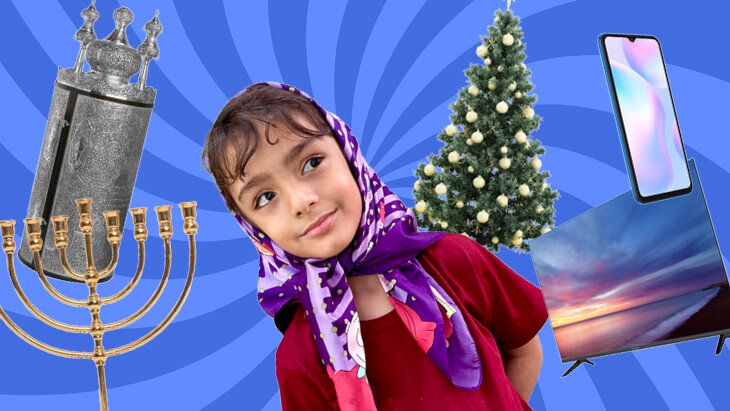 Do You Think They Can Tell That I’m Jewish?
Do You Think They Can Tell That I’m Jewish?


5 min read
Many Iranian American Jews likely will not have Jewish descendants in the coming decades. It’s our fault. We’re applying an old formula to a new country.
Like many children in the U.S., I once begged my mother to let me attend a Friday night sleepover.
“It’s Shabbat night,” she declared in Persian. “You don’t go out on Shabbat night.”
“Why?” I prodded. “I want to go to this sleepover and eat something called ‘Chinese food.’”
“But we’ve always ‘done’ Shabbat.” she cried. “It’s a time for family and Full House.”
I grew up in the 1990s when ABC aired TGIF television programs like, yes, Full House.
I didn’t accept my mother’s response because there was no soul in it.
There’s something about this story that’s uniquely Persian, and at the risk of excommunication, I’ve been waiting 20 years to declare the following:
With our misguided belief that tradition alone is enough to ensure Jewish continuity, many Iranian American Jews will likely not have Jewish descendants in the coming decades.
With our misguided belief that tradition alone is enough to ensure Jewish continuity, many Iranian American Jews will likely not have Jewish descendants in the coming decades.
It’s our fault. We applied an old formula to a new country.
In Iran, we didn’t worry much about assimilation. First, social antisemitism made marriage between Jews and non-Jews very difficult. In the U.S., antisemitism doesn’t break up relationships. For Persian Jews, the job of promoting Jewish marriage often belongs to parents, and if those parents die without having imprinted the need and beauty of Jewish continuity, intermarriage will be the result.
Second, we felt less need in Iran to go beyond tradition (toward more learning and Jewish practice), particularly after the 1979 Islamic Revolution, because we were merely trying to survive. No one worries about whether their children will retain their Jewish identity in a country that constantly keeps them in their place as Jews. That’s not an issue in the U.S.
Third, there was an unspoken distance between Muslim and Jewish children in Iran. Often, they learned and played together (at non-Jewish schools), but the level of interaction that Jewish children who attend public schools in the U.S. today have with non-Jewish friends is much greater.
In Tehran, I didn’t partake in non-Jewish traditions with non-Jewish children; in the U.S., I couldn’t wait to help my Christian friends hang ornaments on their Christmas trees, and I viewed them — with their “free” Friday nights — as truly liberated.
There are many Persian Jews who actively are staying connected to Judaism but they now seem a minority.
Hanukkah is a good time to observe my assumption in practice. If you’re a parent, ask yourself if your children — whether 12 or 25 — are exhibiting true understanding that Hanukkah, at its core, is a celebration of non-assimilation, or are they simply excited to unwrap chocolate gelt? Are you basically exposing them to an equally commercialized Jewish version of Christmas?
There aren't enough latkes in the world to instill Jewish pride if the only associations your children have with Hanukkah are the various foods or eight nights of small gifts.
Hanukkah celebrates the courage to not assimilate and the miracle of Jewish continuity. There aren't enough latkes in the world to teach that lesson if the only associations your children have with Hanukkah are the various foods or eight nights of small gifts.
Can you encourage your children to actually look deeply into the small flames of each Hanukkah candle and contemplate a world in which all Jews had succumbed to Hellenism? Or do they mindlessly scroll their beloved phones as you light the candles on the Hanukkiah?
Are you using this extraordinary time of year to guide your children and make connections between the worldly obsessions of Hellenism then and today's incessant messages that promise happiness through material objects and the external validation of friends and social media followers?
I’m Persian, and I don’t get Persians.
Beautifully but maddeningly traditional, we actually throw ourselves at Torah scrolls when they’re brought down to the pews, but in our homes, we outsource our children’s hearts and souls to their friends and phones.
My mother used to practically shove other women out of the way to steal a kiss on the Torah, but she never managed to invade my heart with an intoxicating love of being Jewish, because her mother had raised her only with tradition, too.
But my mother grew up in Iran. In the U.S., my Judaism was competing with public school and Friday night sleepovers.
If your kids find little meaning in synagogue services, find another synagogue. If they associate Shabbat only with food (however comforting) and idle chatter, start telling stories. Above all, if they don’t exhibit passion about being Jewish, you must start modeling this for them by practicing Jewish customs with joy — right before their eyes.
Soulful joy makes for a full house.
A version of this article originally appeared in The Jewish Journal

I mean you complain about assimilated Hanukkah traditions and how there aren’t enough ashkenazi gelts to invade your heart with hob e Israel ( Ahava Israel), yet you blame the traditions that were absent in those very crony American Jewish traditions that have to compete with cute sleepovers. Ironically what I take away from your piece is the potential of assimilation due to lack of preserving authentic Persian Babylonian Jewish heritage, in favor of what you call “real Jewish learning and practice”.
This is not a problem limited to the Persian Jews. It is a universal problem. Why are the Persian Jews singled out?